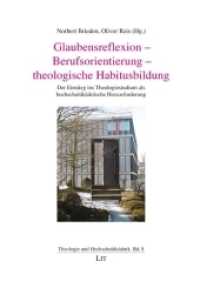- ホーム
- > 洋書
- > 英文書
- > Psychology
Full Description
With contributions from Lord John Alderdice, Deniz Arıboğan, Abdülkadir Cevik, Senem B. Çevik, Coline Covington, Robi Friedman, David Fromm, M. Gerard Fromm, Hiba Husseini, Aleksandr V. Obolonski, Ford Rowan, Regine Scholz, Edward R. Shapiro, Vamık D. Volkan
The International Dialogue Initiative (IDI) is a private, international, multidisciplinary group comprised of psychoanalysts, academics, diplomats, and other professionals who bring a psychologically informed perspective to the study and amelioration of societal conflict. It aims to provide a reflective space to enable an understanding of how the emotional and historical background of hostile relations - often related to trauma - is being experienced in the present. By doing so, antagonists can overcome resistances to dialogue and facilitate the discovery of peaceful solutions to intergroup problems. This book brings together key members of the IDI to present the theory and practice of the important work they do. At its heart, the book holds the idea that, while traumatic experiences may happen to an individual or a family, they also affect society and large-group identity over long periods of time. In that way, trauma plays out between generations and between countries.
The book is divided into three parts: theory, application, and methodology. Trauma is the key thread running throughout and the distinguished contributors investigate healing, dehumanisation, memory, the pandemic, war, terrorism, identity, culture, the law, justice, and religion, among many other fascinating topics. The authors bring in case studies from all over the world, including the United States, Northern Ireland, Russia, Israel, Turkey, Germany, Egypt, and Palestine. To make sense of these, they draw on a wide range of approaches: group relations theory, group analytic theory, psychoanalysis, large-group psychology, psychodynamic theory, psychology, economics, sociology, political science, history, journalism, and the law, to name but a few. This must-read book brings theory to vivid life and brings hope that our fractured world can learn to heal.
Contents
Permissions / Acknowledgements
About the editors and contributors
Introduction
M. Gerard Fromm
Part I: Theory
1. Massive traumas, their societal and political consequences and collective healing
Vamık D. Volkan
2. Dehumanization—the defense that makes evil, cruelty and murder possible: a psychoanalytic exploration
Lord John Alderdice
3. When time becomes an illusion: collective trauma and memory
Regine Scholz
4. We don't speak of fear: large group identity and chosen trauma
M. Gerard Fromm
5. Braving the new: the struggle from loss to agency
Coline Covington
6. Two facets of the pandemic: stigmatization and the psychopolitics of heroization
Deniz Arıboğan
Part II: Application
7. American identity
Edward R. Shapiro
8. A study of ethnopolitical conflicts in Russia and other post-Soviet countries
Aleksandr V. Obolonski
9. The German "Welcoming Culture": some thoughts about its psychodynamics
Regine Scholz
10. Identities in flux in a globalized world
Abdülkadir Cevik
11. Cultural exchanges between Turkey and Israel: set for reset
Senem B. Çevik
12. Multiple layers of laws and legal structures: a challenge to rendering justice and a source of identity crisis
Hiba Husseini
13. Religious identity and shared trauma: the First Crusade
Ford Rowan
14. IDI thinking in one Georgetown lawyer working in one small pocket of the legal community
David Fromm
Part III: Methodology
15. International conflict is within individuals: a reflection
Edward R. Shapiro
16. The Sandwich Model: applying the power of small and large groups to conflict resolution
Robi Friedman
17. Traveling through time: a group intervention in Northern Ireland
M. Gerard Fromm
Index








